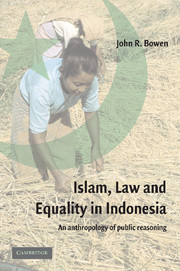3 - Remapping adat
Published online by Cambridge University Press: 07 January 2010
Summary
The debates and conflicts over land in Isak show that village norms do not provide a rule book to be applied to each practical situation. The ideas, values, and phrases associated with adat are resources that can be mobilized to provide normative support for claims, but what I have called adat's second face, that of power and inequality, inflects the direction in which resolution is reached.
To point to the workings of power is not to say that adat's rules have no coherence. We may indeed contrast Gayo adat with alternatives ways of mapping people, places, and property, such as those to be found in other Indonesian societies, or in certain representations of Islamic law. At those moments when a local specialist such as Aman Kerna highlights the contrasts among institutions, the norms presented as “Gayo adat” cohere around certain ideas of collective social continuity, centered on the village and the descent line, that are to be distinguished from the rules of Islamic law, or the workings of the state. As they are represented and typified at such “metanormative” moments of contrast, adat norms highlight the value of maintaining links to the ancestors. In the case settled by Aman Kerna, maintaining these links required people to follow the distributive commands of the previous generation.
In the way most Isak people see most things, collective agrarian life requires maintaining ties with the dead and ties among the living.
- Type
- Chapter
- Information
- Islam, Law, and Equality in IndonesiaAn Anthropology of Public Reasoning, pp. 44 - 64Publisher: Cambridge University PressPrint publication year: 2003



